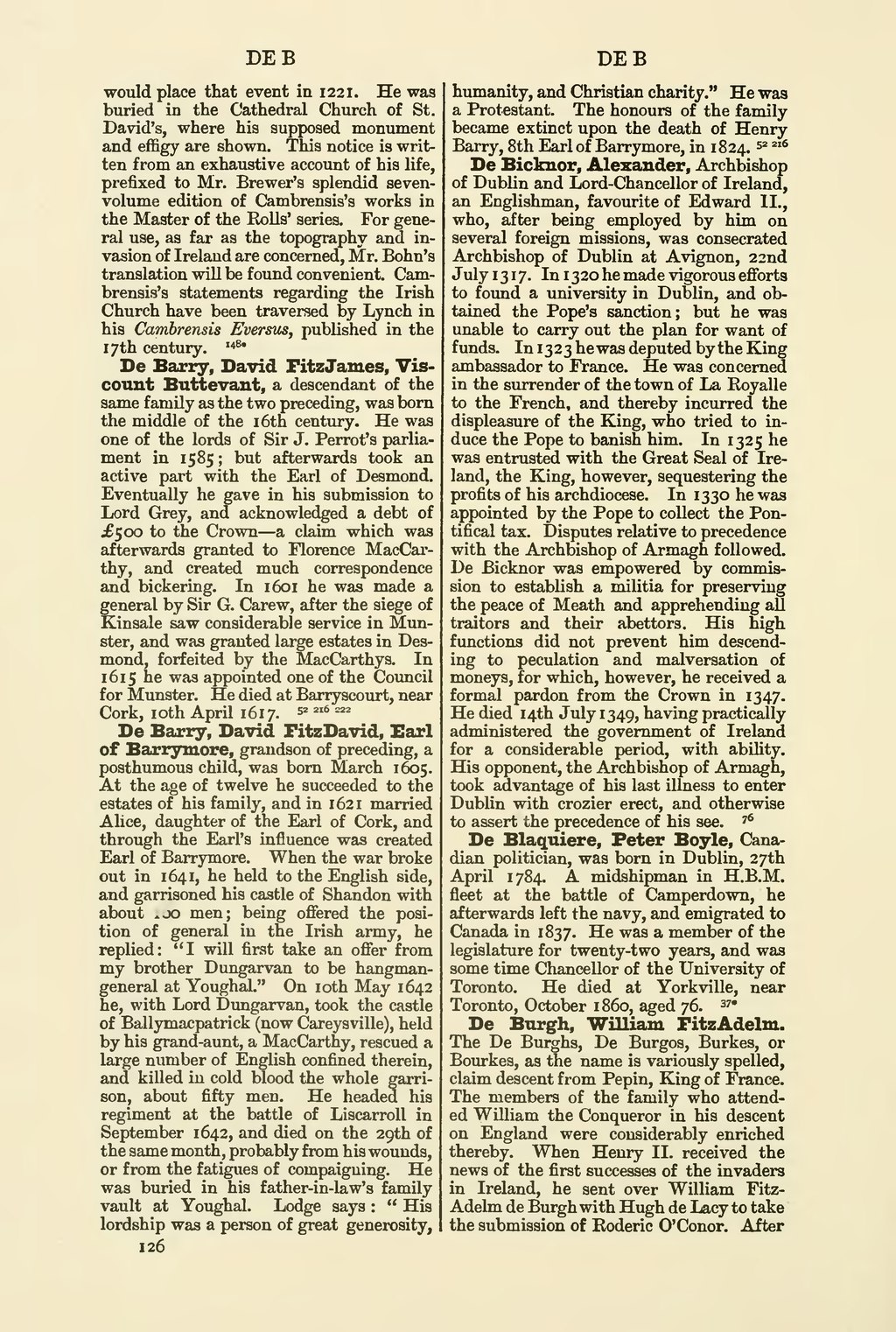would place that event in 1221. He was buried in the Cathedral Church of St. David's, where his supposed monument and effigy are shown. This notice is written from an exhaustive account of his life, prefixed to Mr. Brewer's splendid seven-volume edition of Cambrensis's works in the Master of the Rolls' series. For general use, as far as the topography and invasion of Ireland are concerned, Mr. Bohn's translation will be found convenient. Cambrensis's statements regarding the Irish Church have been traversed by Lynch in his Cambrensis Eversus, published in the 17th century.148*
De Barry, David FitzJames, Viscount Buttevant, a descendant of the same family as the two preceding, was born the middle of the 16th century. He was one of the lords of Sir J. Perrot's parliament in 1585; but afterwards took an active part with the Earl of Desmond. Eventually he gave in his submission to Lord Grey, and acknowledged a debt of £500 to the Crown—a claim which was afterwards granted to Florence MacCarthy, and created much correspondence and bickering. In 1601 he was made a general by Sir G. Carew, after the siege of Kinsale saw considerable service in Munster, and was granted large estates in Desmond, forfeited by the MacCarthys. In 1615 he was appointed one of the Council for Munster. He died at Barryscourt, near Cork, l0th April 1617. 52 216 222
De Barry, David FitzDavid, Earl of Barrymore, grandson of preceding, a posthumous child, was born March 1605. At the age of twelve he succeeded to the estates of his family, and in 1621 married Alice, daughter of the Earl of Cork, and through the Earl's influence was created Earl of Barrymore. When the war broke out in 1641, he held to the English side, and garrisoned his castle of Shandon with about 100 men; being offered the position of general in the Irish army, he replied: "I will first take an offer from my brother Dungarvan to be hangmangeneral at Youghal." On l0th May 1642 he, with Lord Dungarvan, took the castle of Ballymacpatrick (now Careysville), held by his grand-aunt, a MacCarthy, rescued a large number of English confined therein, and killed in cold blood the whole garrison, about fifty men. He headed his regiment at the battle of Liscarroll in September 1642, and died on the 29th of the same month, probably from his wounds, or from the fatigues of compaigning. He was buried in his father-in-law's family vault at Youghal. Lodge says: "His lordship was a person of great generosity, humanity, and Christian charity." He was a Protestant. The honours of the family became extinct upon the death of Henry Barry, 8th Earl of Barrymore, in 1824. 52 216
De Bicknor, Alexander, Archbishop of Dublin and Lord-Chancellor of Ireland, an Englishman, favourite of Edward II., who, after being employed by him on several foreign missions, was consecrated Archbishop of Dublin at Avignon, 22nd July 1317. In 1320 he made vigorous efforts to found a university in Dublin, and obtained the Pope's sanction; but he was unable to carry out the plan for want of funds. In 1323 he was deputed by the King ambassador to France. He was concerned in the surrender of the town of La Royalle to the French, and thereby incurred the displeasure of the King, who tried to induce the Pope to banish him. In 1325 he was entrusted with the Great Seal of Ireland, the King, however, sequestering the profits of his archdiocese. In 1330 he was appointed by the Pope to collect the Pontifical tax. Disputes relative to precedence with the Archbishop of Armagh followed. De Bicknor was empowered by commission to establish a militia for preserving the peace of Meath and apprehending all traitors and their abettors. His high functions did not prevent him descending to peculation and malversation of moneys, for which, however, he received a formal pardon from the Crown in 1347. He died 14th July 1349, having practically administered the government of Ireland for a considerable period, with ability. His opponent, the Archbishop of Armagh, took advantage of his last illness to enter Dublin with crozier erect, and otherwise to assert the precedence of his see. 76
De Blaqniere, Peter Boyle, Canadian politician, was born in Dublin, 27th April 1784. A midshipman in H.B.M. fleet at the battle of Camperdown, he afterwards left the navy, and emigiated to Canada in 1837. He was a member of the legislature for twenty-two years, and was some time Chancellor of the University of Toronto, He died at Yorkville, near Toronto, October i860, aged 76. 37*
De Burgh, William FitzAdelm. The De Burghs, De Burgos, Burkes, or Bourkes, as the name is variously spelled, claim descent from Pepin, King of France. The members of the family who attended "William the Conqueror in his descent on England were considerably enriched thereby. When Henry II. received the news of the first successes of the invaders in Ireland, he sent over William FitzAdelm de Burgh with Hugh de Lacy to take the submission of Roderic O'Conor. After

